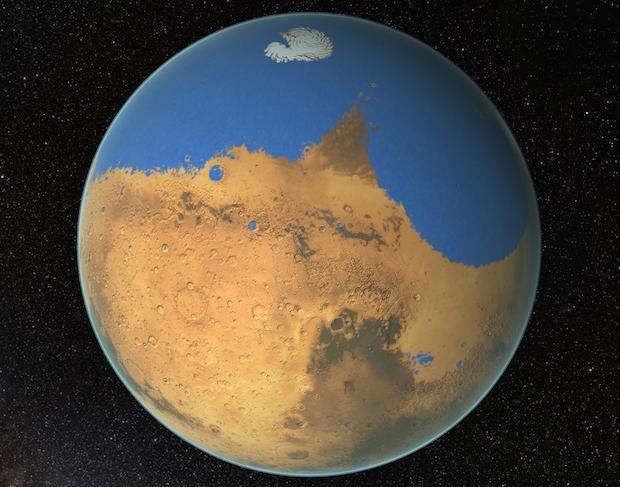
NASA
scientists have determined that a primitive ocean on Mars held more
water than Earth's Arctic Ocean and that the Red Planet has lost 87
percent of that water to space.
NASA/GSFC
Now, NASA scientists for the first time have calculated that the Red Planet held more water than the Arctic Ocean. Using powerful telescopes to measure signatures of water in the planet's atmosphere, they estimated that in its youth, the planet would have probably had an ocean more than a mile deep covering almost half of its northern hemisphere.
The scientists, writing in Thursday's issue of Science, said there would have been enough water to cover the entire surface of the planet in a liquid layer about 450 feet (137 meters) deep.
"Our study provides a solid estimate of how much water Mars once had, by determining how much water was lost to space," said Geronimo Villanueva, first author of the paper and a scientist at NASA's Goddard Space Flight Center in Greenbelt, Maryland. "With this work, we can better understand the history of water on Mars."
NASA's Michael Mumma, the second author on the paper, said their work builds on the earlier findings from NASA's Curiosity rover that Mars was contained water 1.5 billion years ago, and extends the timeline further back on account of the new findings.
"With Mars losing that much water, the planet was very likely wet for a longer period of time than previously thought, suggesting the planet might have been habitable for longer," Mumma said.
To unravel the water mystery, NASA scientists used the world's three major infrared telescopes - one at the W.M. Keck Observatory, the NASA Infrared Telescope Facility and the Very Large Telescope - to study water molecules in the Martian atmosphere.
"From the ground, we can actually take a snapshot of the whole hemisphere of the planet on a single night," Mumma said.
They looked at two slightly different forms of water - H2O and HDO, a naturally occurring variation in which one hydrogen is replaced by a heavier form, called deuterium. Unlike normal hydrogen, which is lost to space, the deuterium remains trapped in the Martian atmosphere.
The team was especially interested in regions near the north and south poles because the polar ice caps are the planet's largest known reservoir of water. The water stored there is a window onto the history and evolution of Mars' water from the wet Noachian period, which ended about 3.7 billion years ago, to the present.
"Now we know that Mars' water is much more enriched than terrestrial ocean water in the heavy form of water," Mumma said. "Immediately that permits us to estimate the amount of water Mars has lost since it was young."
They found the atmospheric water in the near-polar region was enriched with deuterium, indicating that Mars had lost a tremendous quantity of water. Mars must have lost a volume of water 6.5 times larger than the present polar caps to provide such large enrichment.
Based on their calculations, the scientists estimate that Mars has lost 87 percent of its ancient ocean to space and that the remaining 13 percent is likely stored in the polar ice caps.
Taking into account the surface of Mars today, a likely location for this water would be in the Northern Plains, which has long been considered a good candidate because of the low-lying ground. An ancient ocean there would have covered about 20 percent of the planet's surface. By comparison, the Atlantic Ocean occupies 17 percent of Earth's surface.
"This ocean had a maximum depth of around 5,000 feet or around one mile deep," Villanueva said. "It's deep - not as deep as the deepest points of our oceans, but comparable to the average depth of the Mediterranean Sea."
By combining the Martian topography with the estimates of water loss, the researchers were able to simulate an ancient ocean on Mars and its escape into space.
As Mars lost its atmosphere over billions of years, the researchers believe it lost the pressure and heat needed to keep water liquid. That caused the ocean to shrink and recede northward, with the remaining water condensing and freezing over the north and south poles and giving Mars the ice caps seen today.

No comments:
Post a Comment